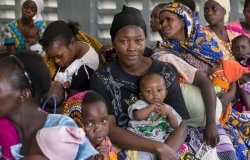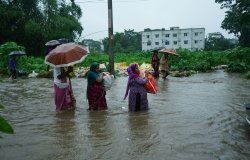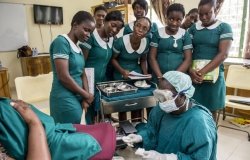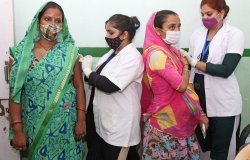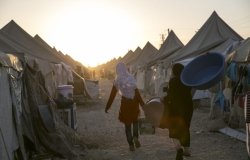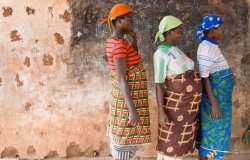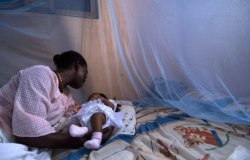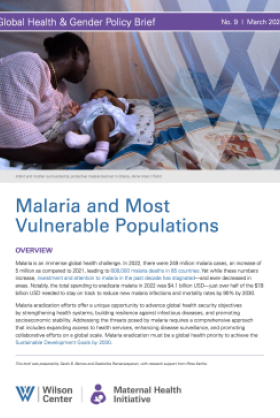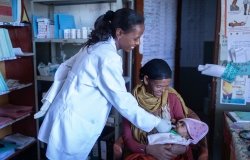Maternal Health and HIV: Global Priorities for Research and Action
Despite the fact that with proper interventions, the likelihood of mother-to-child transmission of HIV is less than five percent, expectant mothers with HIV or AIDS often face intense stigma and marginalization from health care providers around the world. As a result, in some areas, the mortality rate for mothers with HIV is five times greater than the rate for non-infected women
Overview
Despite the fact that with proper interventions, the likelihood of mother-to-child transmission of HIV is less than five percent, expectant mothers with HIV or AIDS often face intense stigma and marginalization from health care providers around the world. As a result, in some areas, the mortality rate for mothers with HIV is seven to eight times greater than the rate for non-infected women, said Dr. Isabella Danel of the U.S. Centers for Disease Control.
Leading researchers, clinicians, and advocates gathered at the Wilson Center on January 13 to discuss the need to re-evaluate maternal health priorities to create an enabling environment for women with HIV. “It’s not only elimination of new HIV infections in children, but it’s keeping the moms alive,” said Dr. Heather Watts, medical officer with the Office of the U.S. Global AIDS Coordinator.
Systematic Failures and Abuses
For women living with HIV throughout the world, the threat of stigmatization upon disclosure of their diagnosis is dire. They are often perceived as promiscuous, blamed for other HIV diagnoses in the family, or threatened with outright hostility over the prospect of having children, said Janet Turan of the University of Alabama.
Florence Anam of the International Community of Women Living With HIV/AIDS said these women, “especially from Africa where I come from, are constantly in fear of losing the status quo of their life – family, friends, relatives, but most importantly the support they get from their male partners or husbands.” According to a study conducted by Turan in Kenya, pregnant women who anticipate male partner stigma are more than twice as likely to refuse HIV testing than those who don’t.
This stigma often results in domestic abuse, and partner abuse of women living with HIV is a global epidemic. Naina Khanna of the Positive Women’s Network noted that a2013 survey of women living with HIV in the United States found 72 percent of respondents were survivors of intimate partner violence or domestic abuse. As a result, they often opt not to disclose their diagnoses and fail to receive the necessary care and counseling.
In the developing world, when women do disclose, they face another set of barriers. Clinics are often prohibitively far to reach by foot and women living with HIV can be asked to make the trip several times. “Going to the hospital to get tested at an [antenatal care] clinic and be told you’re HIV positive means you have to go back and bring your partner, and then you have to come back with him or bring someone to the clinic and they have to be told you’re HIV positive,” said Anam. “So many women come to the clinic when they’re pregnant, but do not come back again.”
And health care providers are often misinformed about the nature and treatment of HIV. “Many times, providers are operating under false assumptions about the risk of transmission, which is added to already existing discrimination and stigma,” said Tamil Kendall of the Harvard School of Public Health.
After carrying out community-based surveys on reproductive rights violations in Mexico, El Salvador, Honduras, and Nicaragua, Kendall noticed a clear trend of withheld care and abuse. Some survey participants recounted harrowing ordeals, ranging from complete denial of treatment to coerced or forced sterilization, including the story of one survey participant who was surgically sterilized without her consent while under anesthesia from another procedure. Such systemic failures and abuses seem to be the rule rather than the exception, said Kendall. “Under half of the women [surveyed] considered that they had received comprehensive reproductive health services, and in fact 41 percent said that they have been discriminated against by health care workers specifically when seeking reproductive services.”
Another study, of care in Tanzanian public health facilities, found 77 percent of all women interviewed, regardless of HIV status, reported some form of abuse by clinicians in the process of delivering a child, according to Dr. Mary Mwanyika-Sando. “If 50 percent of women reported feeling some form of abandonment during an actual time where they were so vulnerable they needed a health care provider to help them as they are about to deliver their child,” she said, “where are we going with all this?”
What Gets Measured Gets Done
Dr. Hannah Sebitloane of the University of KwaZulu-Natal in South Africa believes a more focused research agenda could help. “Why is an HIV [-positive] pregnant woman in the area where HAART is now accessed…still more likely to die just because she has HIV?” she asked. That can’t easily be answered right now, and better quantifying the negative effects of not seeking care could tangibly show how social and medical stigmas are harming mothers.
To this end, Kendall and Danel shared the results of a new study on anti-retroviral therapy (ART). It is crucial to document and evaluate ways to improve access and retention of care, they said, and available evidence shows improving access to ART for women living with HIV can make a significant impact in lowering mortality rates. “The longer women are on ART,” Danel said, “the risk goes down further.” On one hand, these are promising results, but overall, pregnant women are less likely than other adults to get the treatment, Kendall noted, meaning there’s a clear gap in distribution that is likely systematic and due to stigma.
Combating Stigma Not An Easy Task
Overcoming the stigma that dissuades mothers living with HIV from seeking care is ultimately the goal, said the panelists.
Personal accounts from people actually experiencing these stigmas can help tremendously, said Anam. “People living with HIV need to be involved in documenting qualitative research…it actually brings out the voices in what people, especially women, indicate as their challenges, and why exactly they do not access, or do not have the adequate medication, or do not get to the hospital in time.”
Public support groups can also be effective. These groups allow mothers living with HIV to understand the needs of their child and themselves in a way that the impersonal nature of primary medical care often does not, Anam said. “You’re told, don’t breastfeed and nobody tells you why; check your medicines at this time and no one tells you why. But then moving this to a support group then breaks it down. This is what your medicine does, this is why you need to take it…The woman begins to understand it, and then begins to own it.”
Kendall suggested a concerted effort to engage men, to prevent violence against women living with HIV and to reduce stigma caused by misinformation. Reaching men often proves difficult, however, as many don’t participate in maternity care, regardless of HIV/AIDS, she said. “We know less about how to engage men who are not already choosing to come to ante-natal clinics with their female partners in HIV testing and in support.”
Ultimately, any effort to combat stigma needs to put the empowerment of mothers living with HIV first and foremost. As Anam points out, the effect of solidarity and group support is vital. “You walk out of that test room and you’re confused, and you don’t know what to do, and when you sit somewhere with that group of people and you realize you’re not alone – that in itself is huge. I don’t know how we can document that, but it’s huge.”
Event Resources:
· Friday Podcast With Tamil Kendall
· Video
Drafted by Donald Borenstein, edited by Schuyler Null
Correction: A previous version of this summary stated that “women who are not receiving ART are seven to eight times more likely to die during pregnancy or during the post-partum period than mothers living with HIV who receive ART throughout their pregnancy.” In fact, Danel said women living with HIV overall are seven to eight times more likely to die during pregnancy or during the post-partum period than women without.
Documents & Downloads
- Maternal Health and HIV: Global Priorities for Research and ActionDownload
- Maternal Health and HIV: Global Priorities for Research and ActionDownload
- Maternal Health and HIV: Global Priorities for Research and ActionDownload
- Maternal Health and HIV: Global Priorities for Research and ActionDownload
- Maternal Health and HIV: Global Priorities for Research and ActionDownload
- Maternal Health and HIV: Global Priorities for Research and ActionDownload
Speakers
Dr. Isabella Danel
Tamil Kendall
Florence Anam
Dr. Hannah Sebitloane
Dr. Heather Watts
Naina Khanna
Dr. Mary Mwanyika-Sando
Janet Turan
Dr. Lynn Collins
Kathleen McDonald

Sandeep Bathala
Hosted By

Maternal Health Initiative
The Wilson Center’s Maternal Health Initiative (MHI) is dedicated to improving the lives of women, adolescents, and children around the world. MHI convenes experts from around the world to discuss solutions to end preventable maternal and newborn deaths and to navigate gender-based global health issues and their links to foreign policy. MHI explores a wide range of policy-related topics, including gender equity, global health, health care workforce and systems, caregiving, gender-based violence, workforce participation, girls’ education, and sexual and reproductive health and rights. MHI is globally focused with additional attention to women and girls living in humanitarian settings. Read more

Africa Program
The Africa Program works to address the most critical issues facing Africa and US-Africa relations, build mutually beneficial US-Africa relations, and enhance knowledge and understanding about Africa in the United States. The Program achieves its mission through in-depth research and analyses, public discussion, working groups, and briefings that bring together policymakers, practitioners, and subject matter experts to analyze and offer practical options for tackling key challenges in Africa and in US-Africa relations. Read more

Global Risk and Resilience Program
The Global Risk and Resilience Program (GRRP) seeks to support the development of inclusive, resilient networks in local communities facing global change. By providing a platform for sharing lessons, mapping knowledge, and linking people and ideas, GRRP and its affiliated programs empower policymakers, practitioners, and community members to participate in the global dialogue on sustainability and resilience. Empowered communities are better able to develop flexible, diverse, and equitable networks of resilience that can improve their health, preserve their natural resources, and build peace between people in a changing world. Read more
Thank you for your interest in this event. Please send any feedback or questions to our Events staff.
